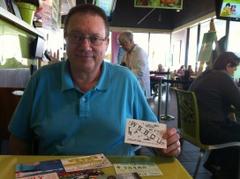 Patch Palm Harbor, FL --
Patch Palm Harbor, FL --It began as a hobby. In the mid 1970s, Kevin Poorman would hang out in his best friend's basement in Terre Haute, Ind., and listen to the handheld amauteur radio or HAM.
More 30 years later, Poorman, a licensed HAM operator, has talked with people on almost every continent, assisted during massive tornadoes and volunteered his skill to various charitable organizations.
It is estimated that 2 million people across the globe operate amateur radios. While many consider it a hobby, HAM operators must be licensed and pass rigorous testing and reaccreditation. The FCC regulates HAM operators in the U.S. In times of disasters, including hurricanes, tornadoes and earthquakes, HAM operators often assist delivering important information to the National Weather Service and public.
For Poorman, a Palm Harbor resident and microbiologist by day, the ability to "be in Terre Haute, Ind., and be able to talk to somebody in California or England," was what sparked his interest in amateur radio.
As the years went on, Poorman discovered his hobby could be put to good use in the community. In 1994, Poorman was living in Manhattan, Kansas with his wife and three children. It was there he decided to join the town's Skywarn Program, the National Weather Service’s civilian weather watcher club.
The Skywarn group also offered amatuer radio licensing classes. Poorman decided to enroll in classes to renew his license. There he became a member of trained weather watchers who used their amateur radio operating skills to alert the public and weather service of inclement weather.
"It’s so flat there you could see the weather coming for hours," he said. "I could get up in the morning, see clouds on the horizon and know what kind of weather we'd be getting that evening."
In Kansas, Poorman experienced tornadoes that flipped over semi-trucks, uprooted trees and houses.
"We spent many nights huddled in the basement," Poorman recalled, adding that he always had his HAM radio nearby to hear conditions outside.
When Poorman and his family moved to Houston, Texas he and other operators were on the frontline of the introduction of the National Weather Service's advanced Doppler Radars.
"A lot of times the HAM operators would phone in and say 'I’m seeing hail' and the net control at the National Weather Serbice would use the radar to see what we were seeing so they could determine what hail looked like on the new radar," he said. "They still wanted the ground truth.”
Among the first rules of being a HAM operator is to not endanger yourself while tracking bad weather, Poorman explains.
"If a tornado is coming at you don’t stand in the yard talking until you get hit," he said.
Still with all of his training and experience, Poorman is confident that HAM operators would be essential should a severe hurricane hit the Tampa Bay area.
HAM radios generall transmit information 5 minutes faster than normal radio, Poorman said.
"That's the kind of lead time that saves lives," he said.
Besides doing emergency communication, Poorman also has access to a national network.
"I can get messages from here to across the country," he said. "In a disaster the main thing we do is get the info out that people are alive and OK to families."
When Poorman isn’t spotting bad weather, he’s engaging the community with volunteer efforts.
Currently, Poorman is coordinating a volunteer effort with fellow HAM operators to help out at the Multiple Sclerosis Walk in Largo on March 16. The radio operators will sit at various post communicating with one another and organizers about what is happening along the walk route.
And then there is the pure enthusiast aspect of HAM operators. That means communicating with people from across the globe on everyday topics from the weather to equipment checks.
The HAM radio crowd is about civility Poorman explained. Politics and religion are red button discussion topics. And cursing is a no-no.
"And it’s funny because very little is in the law," Poorman said about HAM operator ethics. "It’s just self-enforced."
On a recent day Poorman displayed a dozen or so “QSL” cards. The cards are post-card size and mailed between HAM operators who have communicated with each other. Poorman has QSL cards from across the globe including Algeria, Guyana and Bulgaria.
Among his favorites is one from a man who lived in El Paso, Texas. At 105, he was said to be the oldest living HAM operator. Instead of a formal and plain card, his depicted an illustrated scene of the small border town he lived in, replete with an illustration of a nearby red-light district.
“He was a hoot,” Poorman said.
*Are you a Pinellas County resident who is an avid HAM operator. The Pinellas County Emergency Management Department is looking for volunteers.*
*Want to share your HAM operator knowledge with Patch? Tell us in the comments.* Reported by Patch 4 hours ago.